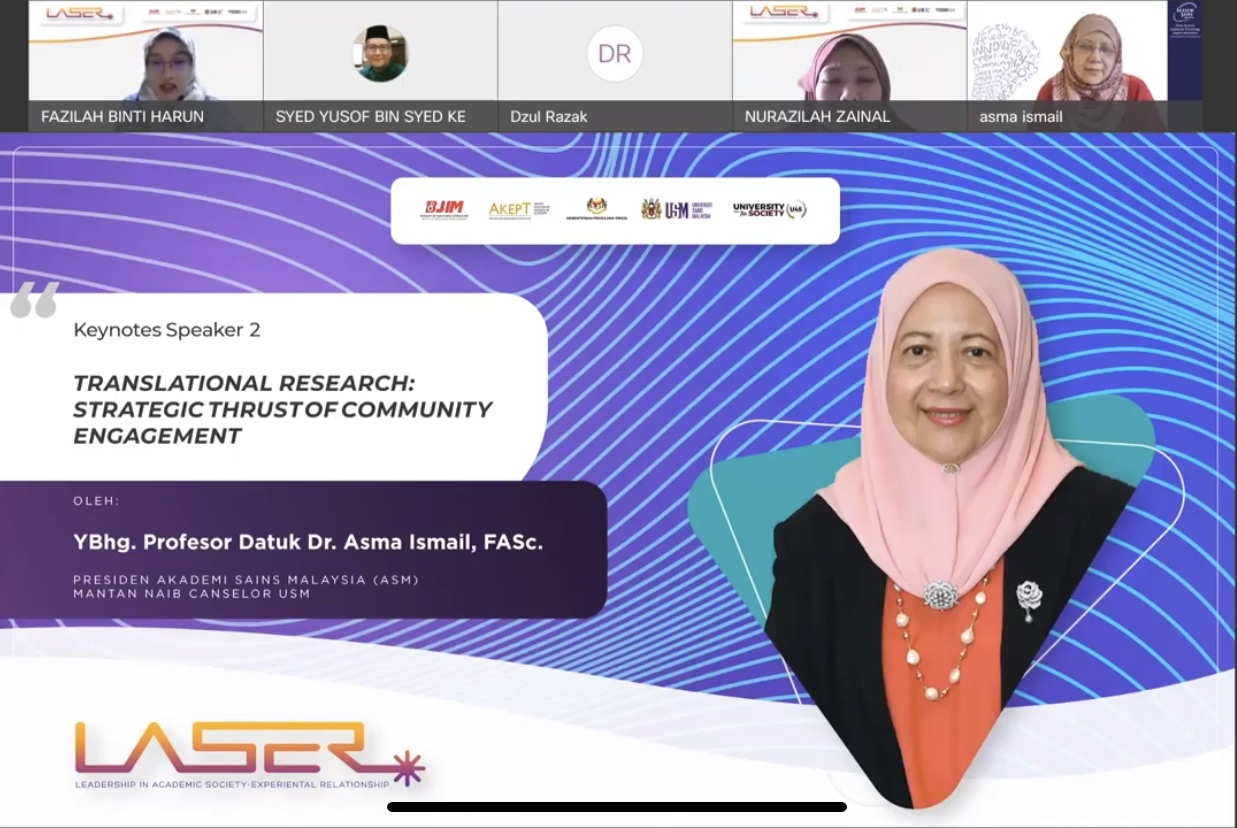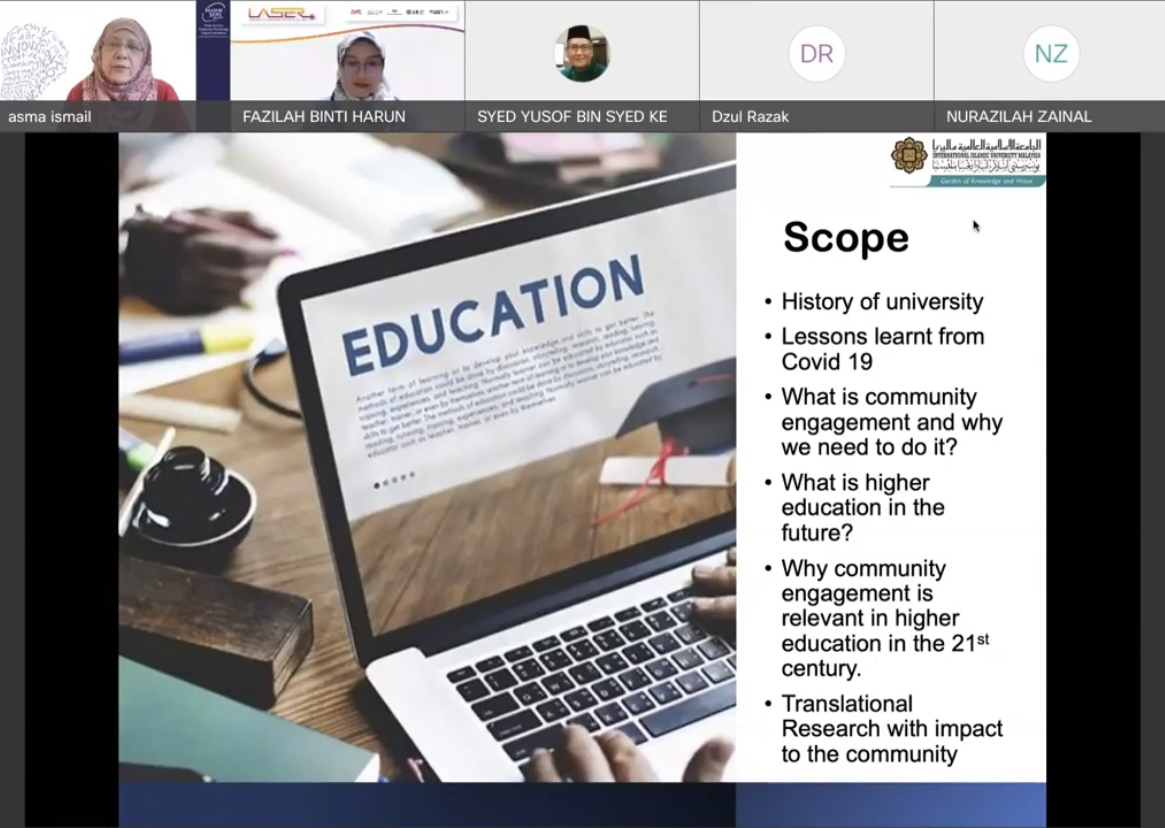COMMUNITY ENGAGEMENT IS ESSENTIAL IN TRANSLATIONAL RESEARCH AS PART OF NATION-BUILDING
USM PENANG, 22 September 2021 – In facing the current COVID-19 pandemic, we have learned that science and technology alone are not enough to solve the global health problems, and in order to meet the 21st century challenges, we need a strategic and systematic integration of science, technology, arts and humanities, along with an innovative, entrepreneurial and global mindset which need to work together to engage the public understanding.
Knowledge creation must be for public good, and based on what we are doing, we need to work in a collaborative ecosystem to provide solutions that can create sustainable change which involves the community through the discussions and in the implementation towards creating sustainable change.

Such views were shared by the former Vice-Chancellor of Universiti Sains Malaysia (USM), Professor Datuk Dr. Asma Ismail during her keynote speech entitled, "Translational Research: Strategic Thrust of Community Engagement” at the Leadership in Academic-Society Experiential Relationship (LASER) programme, which was held virtually via Webex.
“In order to create sustainable change, we need to move research across the value chain from fundamental to translational research with impact and to create impact, research done must be human-centric,” she said.
According to Asma, the creation of a university must be values-based, that will use its knowledge to provide solutions for public good in ensuring a sustainable tomorrow and nurturing a balanced nation-builder, where values-based education becomes essential to create a balance between knowledge and character.
“To be part of the collaborative economy, the future requires our students to be flexible and adaptable, inter-culturally competent, be a problem-solver with critical thinking and great communication skills, and to understand and respect other races and nationalities.
“With the higher education blueprint, when we nurture the future generation, we want values, unity in diversity, global citizens with an upward mindset and having a balance between knowledge and character in our education,” added Asma, who is currently the President of Academy of Sciences Malaysia.
In addition, she emphasised the relevancy of Community Engagement (CE) in higher education, as it is one way to restore the universities to fulfil their social obligation and inculcate values-driven among the students, besides volunteerism that involves experiential learning or service-learning by the academic staff and students.
“At USM, we have the Bakti Siswa programme, where we train the future generation of Malaysia to understand the people and learn from the community, as there is a lot to learn to become a nation-builder.”

She further explained, “To win back the trust that has been lost, universities play an important role through collaborations and engagements with the communities by creating opportunities to work personally and directly with them in sharing knowledge, listening to creative ideas, and working together on projects that have practical applications within the community.”
“The relevancy for the knowledge created must involve listening and observing on what the community wants, then tap into their talents and try to recognize what are the problems and opportunities, seek and analyse the evidence, discuss and implement the activities and lastly, undergo the reflections on the activities performed to reiterate the learning experience.
“With the help of Translational Research, the communities could be prevented from sliding back into poverty, countries could meet and anticipate workforce needs, find innovative solutions to pressing development problems and can pave the way for more equitable development paradigms,” said Asma.
She continued, “The research performed must have the right values as it will give us a sense of purpose and provide meaning to it, and it will guide us to ask the question of how we can make a difference today.”
“To go beyond academia and create knowledge for change, community engagement becomes important in the journey to create impact and should be part of the academic curriculum.”
According to Asma, “Allowing the community to create and test run their ideas, they can learn and be part of the technological revolutions for them to feel educated, enabled and empowered, as it will impact the economic transformation of the community and provides experiential learning on values and character-building of the community, students, and staff.”
“The reality on the ground of translational research is that we need to make sure on the implementation of the solutions without requiring extensive structural or operational changes and to collaborate with workers and community leaders from the area to come up with strategies and to learn about possible barriers.
“The experimental design must be a quadruple-helix design engagement when moving the translational research because we must enable, educate and empower the community to help themselves, only then can the solutions to the needs of the people be realized to their true potential,” she further stressed.
Text: Nur Farrah Ezlin Mohd Suhaimi/Editing: Mazlan Hanafi Basharudin
- Created on .
- Hits: 1080
